How to use AI for sale? Explore Ways & Use Cases
How to use AI for sale? Explore Ways & Use Cases
How to use AI for sale? Explore Ways & Use Cases
Know how AI can automate tasks, personalize outreach & predict customer needs to boost your sales. Learn how Metaform can help you leverage its power.
Know how AI can automate tasks, personalize outreach & predict customer needs to boost your sales. Learn how Metaform can help you leverage its power.
Know how AI can automate tasks, personalize outreach & predict customer needs to boost your sales. Learn how Metaform can help you leverage its power.
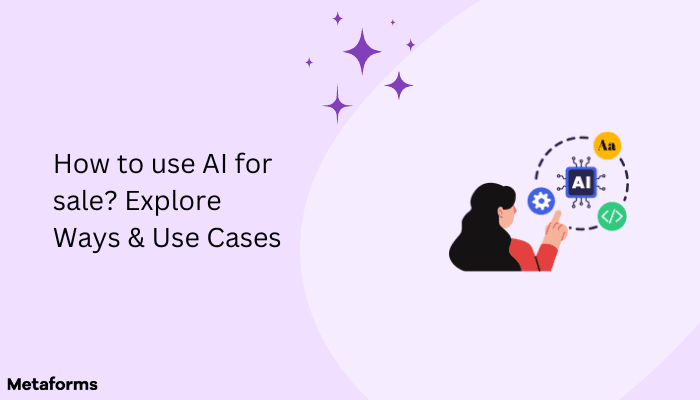


Stuck spending hours on repetitive tasks instead of closing deals? Then opt AI for sale.
Already 51% of eCommerce businesses has chosen AI to deliver a flawless experience.
Also, AI is seen useful in marketing strategy by 64% of B2B marketers.
It automates all those repetitive tasks, predicting exactly what your customers need, and closing deals faster than ever before.
But even the best AI needs a good foundation.
The key to unlocking its power lies in asking the right questions to understand your customer’s needs. Think about it - if you were selling someone an iPhone, wouldn't you want to know if they're a photography enthusiast or a fitness tracker fanatic?
The right questions lead to the right insights, which is where AI-powered forms come forward to help you get right feedback for your business.
Start building your first AI form now!
In this guide, we'll break down everything you need to know about how to use AI for sale and explore its ways to use, and look into some use cases as well!
Also read: Mastering customer feedback for business growth
What is Sales AI Technology?
Sales AI is like a super-powered helper for salespeople. It uses artificial intelligence to automate boring tasks, understand your customers better, and close more deals. Basically, it frees you up to focus on the fun part - talking to customers and winning sales!
Why is AI Important in Sales?
Sales AI is important for a few key reasons, all geared towards making your sales life easier and more successful:
Boosts Efficiency
Remember all that time spent on repetitive tasks like emails and data entry? Sales AI automates those, freeing you up to focus on what really matters - building relationships with customers and closing deals.
According to MIT, When compared to workers who do not use it, generative AI can increase a highly skilled worker's performance by as much as 40%.
Knows Your Customers Better
Sales AI analyzes tons of customer data, uncovering their needs, preferences, and buying habits. Sales AI can listen in and help you understand how they felt during the conversation.
AI uses super-smart language skills (called NLP) to analyze these interactions. It figures out if the customer seemed happy, frustrated, or somewhere in between. This way, you know exactly how things went and can adjust your approach for next time!
Predictions for Success
Sales AI doesn't just understand your customers, it can predict their future needs! Sales forecasting is all about trying to guess how much you'll sell in the future. Yeah, this can be a guessing game but AI changes the game!
AI is super good at crunching numbers and understanding patterns. It can look at how markets shift, how customers behave, and even how seasons affect sales.
With all this info, AI can make much more accurate predictions than just guessing. This means you can make smarter decisions about your business, like how much stock to keep or what deals to offer. Basically, AI helps you see the future of your sales, without the fortune teller!
Always on Your Side
Sales AI acts like your own personal sales coach, offering real-time insights and suggestions during conversations. It can remind you of past interactions to build rapport, suggest talking points based on customer interests, and even help you overcome objections.
How Can AI Be Used in Sales? Key Features Explained
1. Automation
AI can automate repetitive tasks like sending follow-up emails, scheduling meetings, and entering data into systems. This can save salespeople up to 20% of their time, around 2hours of work each day according to recent study.
This allows them to focus more on high-value activities like building relationships and closing deals. Also, automation tools can increase productivity by 14.5% and reduce marketing overheads by 12.2%.
2. Personalization
AI analyzes vast amounts of customer data to understand preferences and behaviors. It can then create personalized messages and offers. Combine this with the precision of Metaform’s AI to tailor your forms for an even deeper understanding of your clientele.
For example, AI can customize email campaigns based on a customer’s past purchases or browsing history.
3. Predictive Analytics
AI can analyze historical sales data to predict future trends and customer behaviors. It helps sales teams anticipate which customers are most likely to purchase soon.
According to Forrester's study, Companies using predictive analytics are 2.9 times more likely to report revenue growth and achieve 10% higher sales quotas.
4. Lead Scoring
Lead scoring is a way to figure out which potential customers (or "leads") are most likely to buy something from you. AI ranks potential customers based on their likelihood to buy, using data like website interactions, email engagement, and previous purchase history. This helps sales teams focus on the most promising leads.
5. Sales Forecasting
AI provides accurate sales forecasts by analyzing past sales data and current market trends. This helps companies make informed decisions about inventory, staffing, and marketing budgets.
6. Chatbots
AI-powered chatbots can handle customer inquiries around the clock. They provide instant responses to common questions and can escalate more complex issues to human agents.
This improves customer satisfaction and reduces response times.
7. Data Analysis
AI can process and analyze large volumes of sales data quickly, identifying patterns and insights that might be missed by humans. This helps sales teams refine their strategies and make data-driven decisions.
8. CRM Management
AI enhances Customer Relationship Management (CRM) systems by tracking interactions, analyzing customer sentiments, and suggesting next steps for salespeople. It helps maintain and strengthen customer relationships.
Using AI Forms can streamline this process even further, enabling more dynamic interactions and data tracking.
Here’s a quick snapshot of the benefits of using AI in sales.
With these impressive features at play, let's explore some real-world examples of AI driving success.
AI in Sales: Use Case Examples
1. Amazon - AI-Driven Product Recommendations
Company: Amazon
Use Case: Amazon uses AI to power its recommendation engine, which suggests products to customers based on their browsing and purchasing history. The AI system, called "item-to-item collaborative filtering," analyzes user behavior and finds patterns to make personalized recommendations.
This technology helps increase sales by suggesting items that customers are likely to purchase.
Impact: The recommendation engine has significantly boosted Amazon's sales, contributing to a large portion of their revenue. It enhances customer satisfaction by making shopping more convenient and personalized.
Source: About amazon, Technology magazine
2. Microsoft - AI for Sale Forecasting
Company: Microsoft
Use Case: Microsoft uses AI in its Dynamics 365 Sales platform to improve sales forecasting. The AI analyzes past sales data, market trends, and customer interactions to predict future sales. This helps sales teams understand which products will sell best and when, allowing them to plan their strategies accordingly.
Impact: This AI-powered forecasting helps Microsoft’s sales teams make better decisions, optimize their inventory, and increase sales by focusing on the most promising opportunities.
Source: fortune, microsoft
3. H&M - AI Chatbots for Customer Service
Company: H&M
Use Case: H&M uses AI chatbots to handle customer service inquiries on their website and mobile app. These chatbots can answer common questions, help customers find products, and assist with order tracking. The AI learns from interactions to improve its responses over time.
Impact: This reduces the workload on human customer service agents and provides quick, efficient service to customers. It enhances the shopping experience, leading to higher customer satisfaction and increased sales.
Challenges and limitations of AI in sales
While AI offers many benefits for sales, it also comes with challenges and limitations. Here are some of the main issues companies face when using AI in sales.
1. Data Quality and Quantity
Challenge: AI systems need a lot of high-quality data to work well. If the data is incomplete, outdated, or incorrect, the AI's predictions and recommendations won't be reliable.
Impact: Poor data can lead to bad sales forecasts, wrong lead scores, and ineffective marketing strategies. Companies must invest in data cleaning and ensure they collect accurate and relevant information.
This is where Metaforms steps in, ensuring your AI is fed with high-quality and relevant data through smarter forms.
2. Integration with Existing Systems
Challenge: Integrating AI tools with existing sales and CRM systems can be complex and time-consuming. Different systems may not work well together, causing technical difficulties.
Impact: If AI tools are not properly integrated, it can lead to data silos where information is not shared effectively across the organization. This can reduce the overall effectiveness of AI solutions.
3. High Costs
Challenge: Developing and implementing AI systems can be expensive. This includes the cost of software, hardware, and hiring skilled professionals to manage and maintain the AI tools.
Impact: High costs can be a barrier for small and medium-sized businesses. Even large companies need to carefully consider the return on investment (ROI) before committing to significant AI projects.
4. Privacy and Security Concerns
Challenge: AI systems often process sensitive customer data. Ensuring this data is protected from breaches and misuse is critical.
Impact: If data privacy and security are compromised, it can lead to loss of customer trust, legal penalties, and financial losses. Companies must comply with regulations and implement strong security measures.
5. Ethical Considerations
Challenge: AI systems can sometimes make decisions that are biased or unfair. This happens when the data used to train the AI includes biases or when the algorithms are not designed to be fair.
Impact: Biased AI decisions can harm a company's reputation and lead to legal issues. Companies need to ensure their AI systems are transparent and fair.
Will AI Replace Sales Jobs?
AI will change sales jobs, but it won't take them away completely.
AI can do simple tasks like sorting customer information, guessing what people might buy, and chatting with customers online. This helps salespeople save time and focus on things that need a personal touch, like talking to customers and understanding their needs.
AI makes work faster and easier, but it can't connect with people the way humans can. So, AI will help salespeople do their jobs better instead of replacing them.
Conclusion
So, are you wondering if AI is right for your sales team?
A 69% of businesses are already focused on AI in sales activities, according to a recent study, 2024. AI can automate repetitive tasks, personalize outreach, and predict customer needs, all of which can lead to more deals closed and a happier sales team.
However, to reap the full benefits of AI, you need high-quality data to train your models. This is where Metaform can help. Metaform’s intelligent forms can streamline data collection and ensure your AI is fed with the information it needs to thrive.
So, are you ready to see how AI can transform your sales force? Get started with Metaform for free today!
Stuck spending hours on repetitive tasks instead of closing deals? Then opt AI for sale.
Already 51% of eCommerce businesses has chosen AI to deliver a flawless experience.
Also, AI is seen useful in marketing strategy by 64% of B2B marketers.
It automates all those repetitive tasks, predicting exactly what your customers need, and closing deals faster than ever before.
But even the best AI needs a good foundation.
The key to unlocking its power lies in asking the right questions to understand your customer’s needs. Think about it - if you were selling someone an iPhone, wouldn't you want to know if they're a photography enthusiast or a fitness tracker fanatic?
The right questions lead to the right insights, which is where AI-powered forms come forward to help you get right feedback for your business.
Start building your first AI form now!
In this guide, we'll break down everything you need to know about how to use AI for sale and explore its ways to use, and look into some use cases as well!
Also read: Mastering customer feedback for business growth
What is Sales AI Technology?
Sales AI is like a super-powered helper for salespeople. It uses artificial intelligence to automate boring tasks, understand your customers better, and close more deals. Basically, it frees you up to focus on the fun part - talking to customers and winning sales!
Why is AI Important in Sales?
Sales AI is important for a few key reasons, all geared towards making your sales life easier and more successful:
Boosts Efficiency
Remember all that time spent on repetitive tasks like emails and data entry? Sales AI automates those, freeing you up to focus on what really matters - building relationships with customers and closing deals.
According to MIT, When compared to workers who do not use it, generative AI can increase a highly skilled worker's performance by as much as 40%.
Knows Your Customers Better
Sales AI analyzes tons of customer data, uncovering their needs, preferences, and buying habits. Sales AI can listen in and help you understand how they felt during the conversation.
AI uses super-smart language skills (called NLP) to analyze these interactions. It figures out if the customer seemed happy, frustrated, or somewhere in between. This way, you know exactly how things went and can adjust your approach for next time!
Predictions for Success
Sales AI doesn't just understand your customers, it can predict their future needs! Sales forecasting is all about trying to guess how much you'll sell in the future. Yeah, this can be a guessing game but AI changes the game!
AI is super good at crunching numbers and understanding patterns. It can look at how markets shift, how customers behave, and even how seasons affect sales.
With all this info, AI can make much more accurate predictions than just guessing. This means you can make smarter decisions about your business, like how much stock to keep or what deals to offer. Basically, AI helps you see the future of your sales, without the fortune teller!
Always on Your Side
Sales AI acts like your own personal sales coach, offering real-time insights and suggestions during conversations. It can remind you of past interactions to build rapport, suggest talking points based on customer interests, and even help you overcome objections.
How Can AI Be Used in Sales? Key Features Explained
1. Automation
AI can automate repetitive tasks like sending follow-up emails, scheduling meetings, and entering data into systems. This can save salespeople up to 20% of their time, around 2hours of work each day according to recent study.
This allows them to focus more on high-value activities like building relationships and closing deals. Also, automation tools can increase productivity by 14.5% and reduce marketing overheads by 12.2%.
2. Personalization
AI analyzes vast amounts of customer data to understand preferences and behaviors. It can then create personalized messages and offers. Combine this with the precision of Metaform’s AI to tailor your forms for an even deeper understanding of your clientele.
For example, AI can customize email campaigns based on a customer’s past purchases or browsing history.
3. Predictive Analytics
AI can analyze historical sales data to predict future trends and customer behaviors. It helps sales teams anticipate which customers are most likely to purchase soon.
According to Forrester's study, Companies using predictive analytics are 2.9 times more likely to report revenue growth and achieve 10% higher sales quotas.
4. Lead Scoring
Lead scoring is a way to figure out which potential customers (or "leads") are most likely to buy something from you. AI ranks potential customers based on their likelihood to buy, using data like website interactions, email engagement, and previous purchase history. This helps sales teams focus on the most promising leads.
5. Sales Forecasting
AI provides accurate sales forecasts by analyzing past sales data and current market trends. This helps companies make informed decisions about inventory, staffing, and marketing budgets.
6. Chatbots
AI-powered chatbots can handle customer inquiries around the clock. They provide instant responses to common questions and can escalate more complex issues to human agents.
This improves customer satisfaction and reduces response times.
7. Data Analysis
AI can process and analyze large volumes of sales data quickly, identifying patterns and insights that might be missed by humans. This helps sales teams refine their strategies and make data-driven decisions.
8. CRM Management
AI enhances Customer Relationship Management (CRM) systems by tracking interactions, analyzing customer sentiments, and suggesting next steps for salespeople. It helps maintain and strengthen customer relationships.
Using AI Forms can streamline this process even further, enabling more dynamic interactions and data tracking.
Here’s a quick snapshot of the benefits of using AI in sales.
With these impressive features at play, let's explore some real-world examples of AI driving success.
AI in Sales: Use Case Examples
1. Amazon - AI-Driven Product Recommendations
Company: Amazon
Use Case: Amazon uses AI to power its recommendation engine, which suggests products to customers based on their browsing and purchasing history. The AI system, called "item-to-item collaborative filtering," analyzes user behavior and finds patterns to make personalized recommendations.
This technology helps increase sales by suggesting items that customers are likely to purchase.
Impact: The recommendation engine has significantly boosted Amazon's sales, contributing to a large portion of their revenue. It enhances customer satisfaction by making shopping more convenient and personalized.
Source: About amazon, Technology magazine
2. Microsoft - AI for Sale Forecasting
Company: Microsoft
Use Case: Microsoft uses AI in its Dynamics 365 Sales platform to improve sales forecasting. The AI analyzes past sales data, market trends, and customer interactions to predict future sales. This helps sales teams understand which products will sell best and when, allowing them to plan their strategies accordingly.
Impact: This AI-powered forecasting helps Microsoft’s sales teams make better decisions, optimize their inventory, and increase sales by focusing on the most promising opportunities.
Source: fortune, microsoft
3. H&M - AI Chatbots for Customer Service
Company: H&M
Use Case: H&M uses AI chatbots to handle customer service inquiries on their website and mobile app. These chatbots can answer common questions, help customers find products, and assist with order tracking. The AI learns from interactions to improve its responses over time.
Impact: This reduces the workload on human customer service agents and provides quick, efficient service to customers. It enhances the shopping experience, leading to higher customer satisfaction and increased sales.
Challenges and limitations of AI in sales
While AI offers many benefits for sales, it also comes with challenges and limitations. Here are some of the main issues companies face when using AI in sales.
1. Data Quality and Quantity
Challenge: AI systems need a lot of high-quality data to work well. If the data is incomplete, outdated, or incorrect, the AI's predictions and recommendations won't be reliable.
Impact: Poor data can lead to bad sales forecasts, wrong lead scores, and ineffective marketing strategies. Companies must invest in data cleaning and ensure they collect accurate and relevant information.
This is where Metaforms steps in, ensuring your AI is fed with high-quality and relevant data through smarter forms.
2. Integration with Existing Systems
Challenge: Integrating AI tools with existing sales and CRM systems can be complex and time-consuming. Different systems may not work well together, causing technical difficulties.
Impact: If AI tools are not properly integrated, it can lead to data silos where information is not shared effectively across the organization. This can reduce the overall effectiveness of AI solutions.
3. High Costs
Challenge: Developing and implementing AI systems can be expensive. This includes the cost of software, hardware, and hiring skilled professionals to manage and maintain the AI tools.
Impact: High costs can be a barrier for small and medium-sized businesses. Even large companies need to carefully consider the return on investment (ROI) before committing to significant AI projects.
4. Privacy and Security Concerns
Challenge: AI systems often process sensitive customer data. Ensuring this data is protected from breaches and misuse is critical.
Impact: If data privacy and security are compromised, it can lead to loss of customer trust, legal penalties, and financial losses. Companies must comply with regulations and implement strong security measures.
5. Ethical Considerations
Challenge: AI systems can sometimes make decisions that are biased or unfair. This happens when the data used to train the AI includes biases or when the algorithms are not designed to be fair.
Impact: Biased AI decisions can harm a company's reputation and lead to legal issues. Companies need to ensure their AI systems are transparent and fair.
Will AI Replace Sales Jobs?
AI will change sales jobs, but it won't take them away completely.
AI can do simple tasks like sorting customer information, guessing what people might buy, and chatting with customers online. This helps salespeople save time and focus on things that need a personal touch, like talking to customers and understanding their needs.
AI makes work faster and easier, but it can't connect with people the way humans can. So, AI will help salespeople do their jobs better instead of replacing them.
Conclusion
So, are you wondering if AI is right for your sales team?
A 69% of businesses are already focused on AI in sales activities, according to a recent study, 2024. AI can automate repetitive tasks, personalize outreach, and predict customer needs, all of which can lead to more deals closed and a happier sales team.
However, to reap the full benefits of AI, you need high-quality data to train your models. This is where Metaform can help. Metaform’s intelligent forms can streamline data collection and ensure your AI is fed with the information it needs to thrive.
So, are you ready to see how AI can transform your sales force? Get started with Metaform for free today!
Stuck spending hours on repetitive tasks instead of closing deals? Then opt AI for sale.
Already 51% of eCommerce businesses has chosen AI to deliver a flawless experience.
Also, AI is seen useful in marketing strategy by 64% of B2B marketers.
It automates all those repetitive tasks, predicting exactly what your customers need, and closing deals faster than ever before.
But even the best AI needs a good foundation.
The key to unlocking its power lies in asking the right questions to understand your customer’s needs. Think about it - if you were selling someone an iPhone, wouldn't you want to know if they're a photography enthusiast or a fitness tracker fanatic?
The right questions lead to the right insights, which is where AI-powered forms come forward to help you get right feedback for your business.
Start building your first AI form now!
In this guide, we'll break down everything you need to know about how to use AI for sale and explore its ways to use, and look into some use cases as well!
Also read: Mastering customer feedback for business growth
What is Sales AI Technology?
Sales AI is like a super-powered helper for salespeople. It uses artificial intelligence to automate boring tasks, understand your customers better, and close more deals. Basically, it frees you up to focus on the fun part - talking to customers and winning sales!
Why is AI Important in Sales?
Sales AI is important for a few key reasons, all geared towards making your sales life easier and more successful:
Boosts Efficiency
Remember all that time spent on repetitive tasks like emails and data entry? Sales AI automates those, freeing you up to focus on what really matters - building relationships with customers and closing deals.
According to MIT, When compared to workers who do not use it, generative AI can increase a highly skilled worker's performance by as much as 40%.
Knows Your Customers Better
Sales AI analyzes tons of customer data, uncovering their needs, preferences, and buying habits. Sales AI can listen in and help you understand how they felt during the conversation.
AI uses super-smart language skills (called NLP) to analyze these interactions. It figures out if the customer seemed happy, frustrated, or somewhere in between. This way, you know exactly how things went and can adjust your approach for next time!
Predictions for Success
Sales AI doesn't just understand your customers, it can predict their future needs! Sales forecasting is all about trying to guess how much you'll sell in the future. Yeah, this can be a guessing game but AI changes the game!
AI is super good at crunching numbers and understanding patterns. It can look at how markets shift, how customers behave, and even how seasons affect sales.
With all this info, AI can make much more accurate predictions than just guessing. This means you can make smarter decisions about your business, like how much stock to keep or what deals to offer. Basically, AI helps you see the future of your sales, without the fortune teller!
Always on Your Side
Sales AI acts like your own personal sales coach, offering real-time insights and suggestions during conversations. It can remind you of past interactions to build rapport, suggest talking points based on customer interests, and even help you overcome objections.
How Can AI Be Used in Sales? Key Features Explained
1. Automation
AI can automate repetitive tasks like sending follow-up emails, scheduling meetings, and entering data into systems. This can save salespeople up to 20% of their time, around 2hours of work each day according to recent study.
This allows them to focus more on high-value activities like building relationships and closing deals. Also, automation tools can increase productivity by 14.5% and reduce marketing overheads by 12.2%.
2. Personalization
AI analyzes vast amounts of customer data to understand preferences and behaviors. It can then create personalized messages and offers. Combine this with the precision of Metaform’s AI to tailor your forms for an even deeper understanding of your clientele.
For example, AI can customize email campaigns based on a customer’s past purchases or browsing history.
3. Predictive Analytics
AI can analyze historical sales data to predict future trends and customer behaviors. It helps sales teams anticipate which customers are most likely to purchase soon.
According to Forrester's study, Companies using predictive analytics are 2.9 times more likely to report revenue growth and achieve 10% higher sales quotas.
4. Lead Scoring
Lead scoring is a way to figure out which potential customers (or "leads") are most likely to buy something from you. AI ranks potential customers based on their likelihood to buy, using data like website interactions, email engagement, and previous purchase history. This helps sales teams focus on the most promising leads.
5. Sales Forecasting
AI provides accurate sales forecasts by analyzing past sales data and current market trends. This helps companies make informed decisions about inventory, staffing, and marketing budgets.
6. Chatbots
AI-powered chatbots can handle customer inquiries around the clock. They provide instant responses to common questions and can escalate more complex issues to human agents.
This improves customer satisfaction and reduces response times.
7. Data Analysis
AI can process and analyze large volumes of sales data quickly, identifying patterns and insights that might be missed by humans. This helps sales teams refine their strategies and make data-driven decisions.
8. CRM Management
AI enhances Customer Relationship Management (CRM) systems by tracking interactions, analyzing customer sentiments, and suggesting next steps for salespeople. It helps maintain and strengthen customer relationships.
Using AI Forms can streamline this process even further, enabling more dynamic interactions and data tracking.
Here’s a quick snapshot of the benefits of using AI in sales.
With these impressive features at play, let's explore some real-world examples of AI driving success.
AI in Sales: Use Case Examples
1. Amazon - AI-Driven Product Recommendations
Company: Amazon
Use Case: Amazon uses AI to power its recommendation engine, which suggests products to customers based on their browsing and purchasing history. The AI system, called "item-to-item collaborative filtering," analyzes user behavior and finds patterns to make personalized recommendations.
This technology helps increase sales by suggesting items that customers are likely to purchase.
Impact: The recommendation engine has significantly boosted Amazon's sales, contributing to a large portion of their revenue. It enhances customer satisfaction by making shopping more convenient and personalized.
Source: About amazon, Technology magazine
2. Microsoft - AI for Sale Forecasting
Company: Microsoft
Use Case: Microsoft uses AI in its Dynamics 365 Sales platform to improve sales forecasting. The AI analyzes past sales data, market trends, and customer interactions to predict future sales. This helps sales teams understand which products will sell best and when, allowing them to plan their strategies accordingly.
Impact: This AI-powered forecasting helps Microsoft’s sales teams make better decisions, optimize their inventory, and increase sales by focusing on the most promising opportunities.
Source: fortune, microsoft
3. H&M - AI Chatbots for Customer Service
Company: H&M
Use Case: H&M uses AI chatbots to handle customer service inquiries on their website and mobile app. These chatbots can answer common questions, help customers find products, and assist with order tracking. The AI learns from interactions to improve its responses over time.
Impact: This reduces the workload on human customer service agents and provides quick, efficient service to customers. It enhances the shopping experience, leading to higher customer satisfaction and increased sales.
Challenges and limitations of AI in sales
While AI offers many benefits for sales, it also comes with challenges and limitations. Here are some of the main issues companies face when using AI in sales.
1. Data Quality and Quantity
Challenge: AI systems need a lot of high-quality data to work well. If the data is incomplete, outdated, or incorrect, the AI's predictions and recommendations won't be reliable.
Impact: Poor data can lead to bad sales forecasts, wrong lead scores, and ineffective marketing strategies. Companies must invest in data cleaning and ensure they collect accurate and relevant information.
This is where Metaforms steps in, ensuring your AI is fed with high-quality and relevant data through smarter forms.
2. Integration with Existing Systems
Challenge: Integrating AI tools with existing sales and CRM systems can be complex and time-consuming. Different systems may not work well together, causing technical difficulties.
Impact: If AI tools are not properly integrated, it can lead to data silos where information is not shared effectively across the organization. This can reduce the overall effectiveness of AI solutions.
3. High Costs
Challenge: Developing and implementing AI systems can be expensive. This includes the cost of software, hardware, and hiring skilled professionals to manage and maintain the AI tools.
Impact: High costs can be a barrier for small and medium-sized businesses. Even large companies need to carefully consider the return on investment (ROI) before committing to significant AI projects.
4. Privacy and Security Concerns
Challenge: AI systems often process sensitive customer data. Ensuring this data is protected from breaches and misuse is critical.
Impact: If data privacy and security are compromised, it can lead to loss of customer trust, legal penalties, and financial losses. Companies must comply with regulations and implement strong security measures.
5. Ethical Considerations
Challenge: AI systems can sometimes make decisions that are biased or unfair. This happens when the data used to train the AI includes biases or when the algorithms are not designed to be fair.
Impact: Biased AI decisions can harm a company's reputation and lead to legal issues. Companies need to ensure their AI systems are transparent and fair.
Will AI Replace Sales Jobs?
AI will change sales jobs, but it won't take them away completely.
AI can do simple tasks like sorting customer information, guessing what people might buy, and chatting with customers online. This helps salespeople save time and focus on things that need a personal touch, like talking to customers and understanding their needs.
AI makes work faster and easier, but it can't connect with people the way humans can. So, AI will help salespeople do their jobs better instead of replacing them.
Conclusion
So, are you wondering if AI is right for your sales team?
A 69% of businesses are already focused on AI in sales activities, according to a recent study, 2024. AI can automate repetitive tasks, personalize outreach, and predict customer needs, all of which can lead to more deals closed and a happier sales team.
However, to reap the full benefits of AI, you need high-quality data to train your models. This is where Metaform can help. Metaform’s intelligent forms can streamline data collection and ensure your AI is fed with the information it needs to thrive.
So, are you ready to see how AI can transform your sales force? Get started with Metaform for free today!
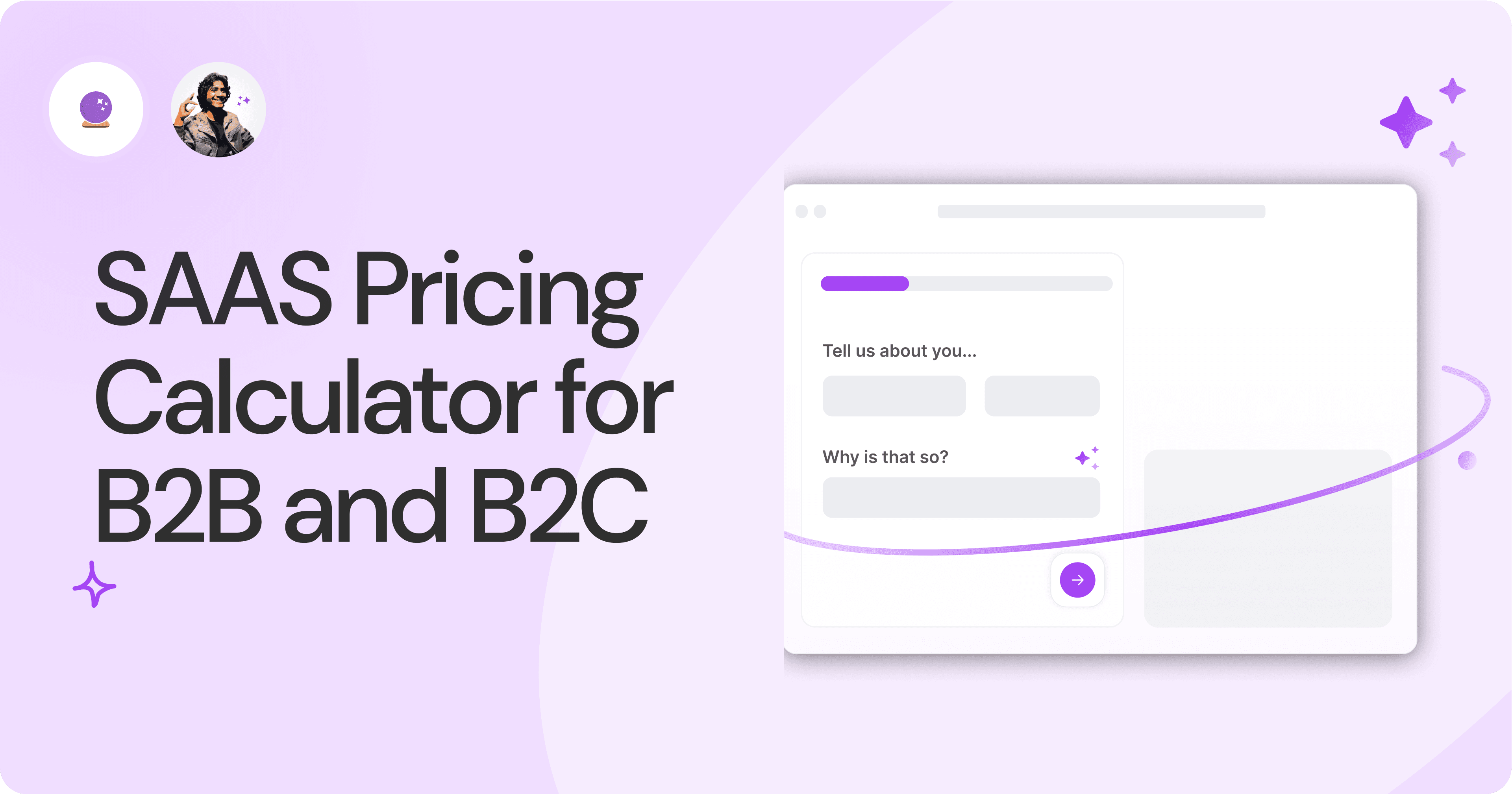
SAAS Pricing Calculators: B2B v B2C Online Forms.
The SaaS pricing calculator is an essential tool for both B2B and B2C SaaS companies. But how do you build it, right? We have you covered.
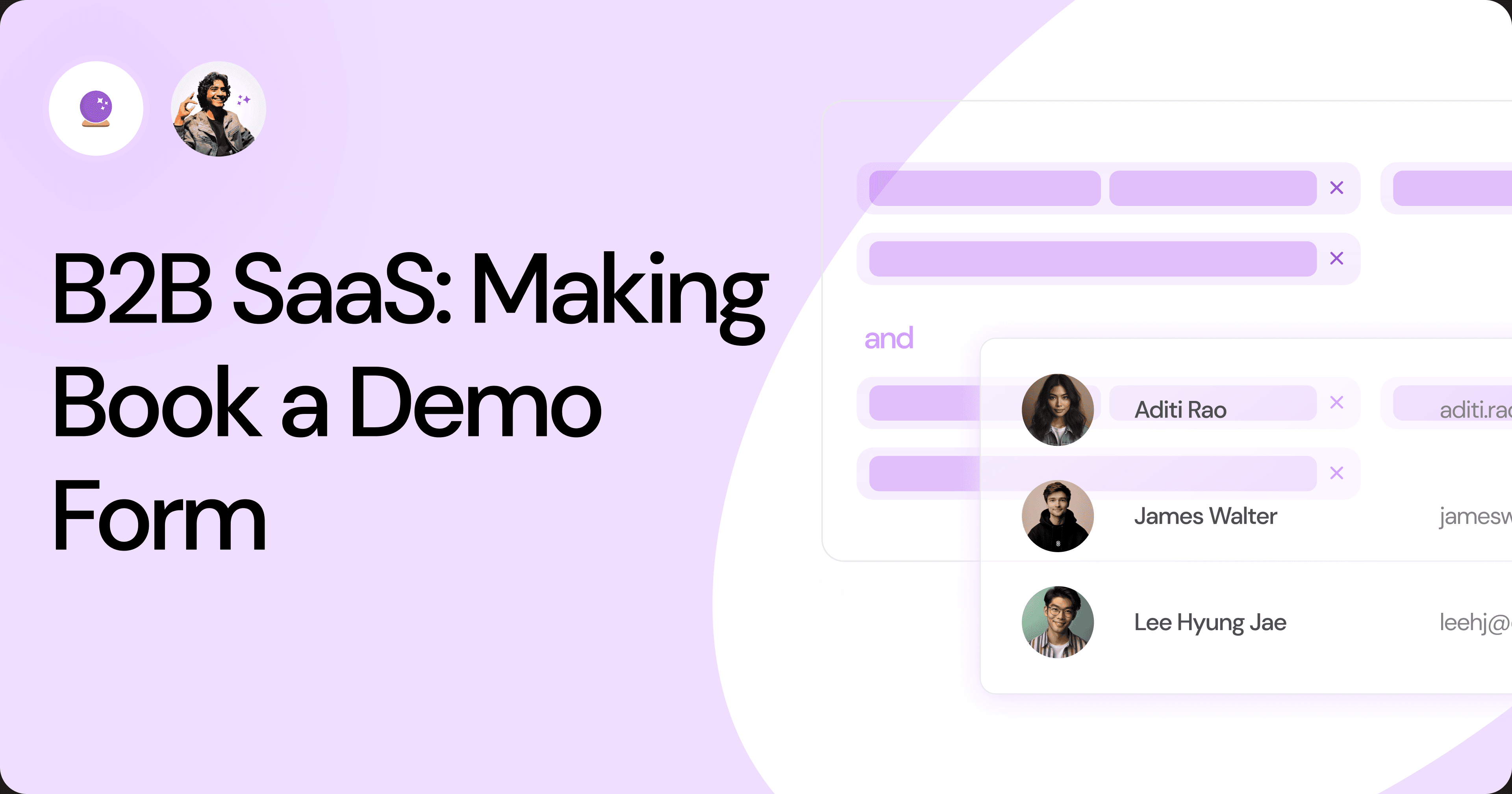
B2B SaaS: Making Book a Demo Form.
Having the perfect book a demo form for B2B SaaS is the first step in capturing leads. There are a few fundamental techniques to get this form right. Read on.
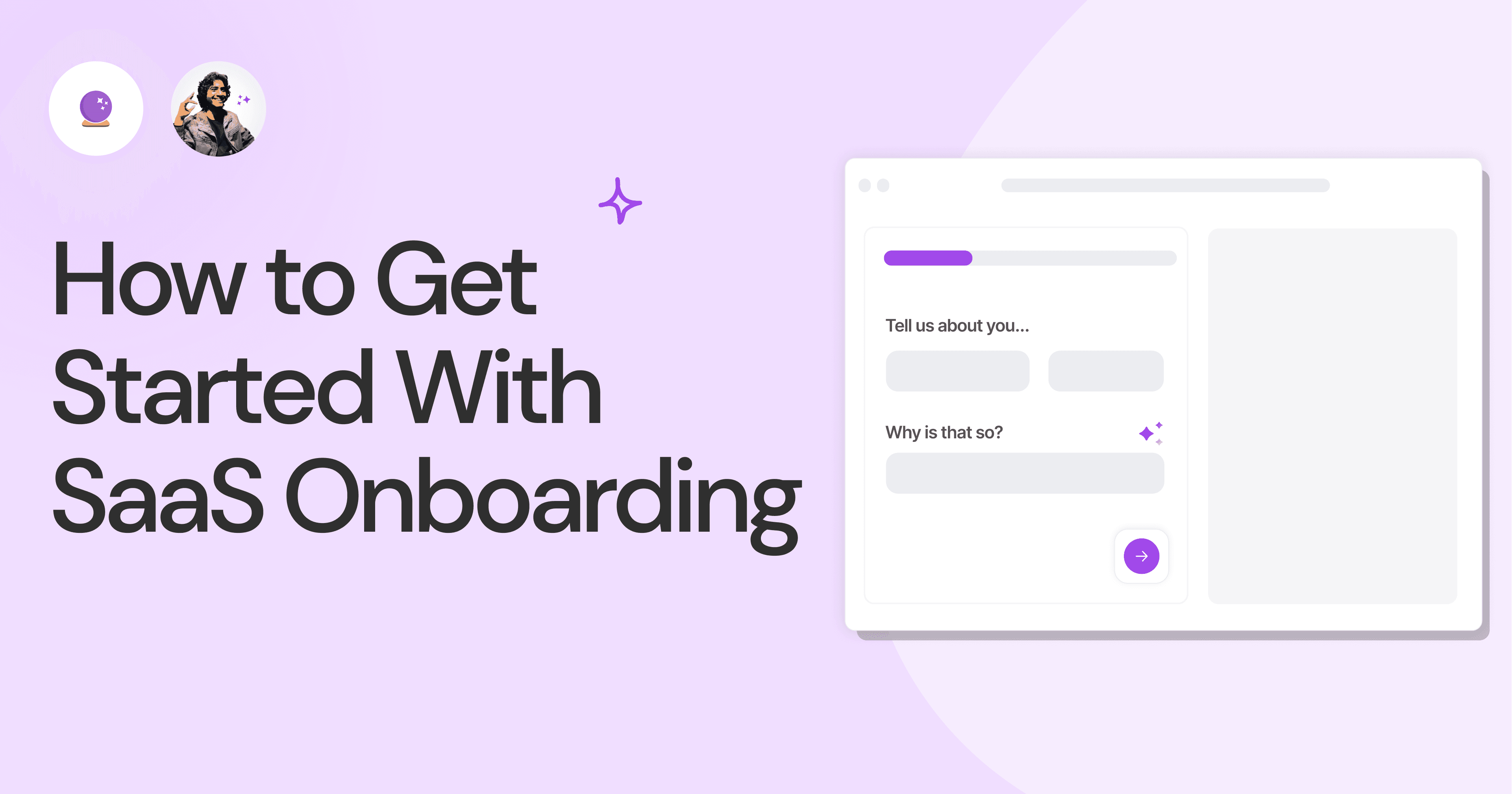
How to Get Started With SaaS Onboarding.
SaaS onboarding is essential for customer onboarding in B2B and B2C SaaS. Let’s understand its fundamentals, including the metrics.
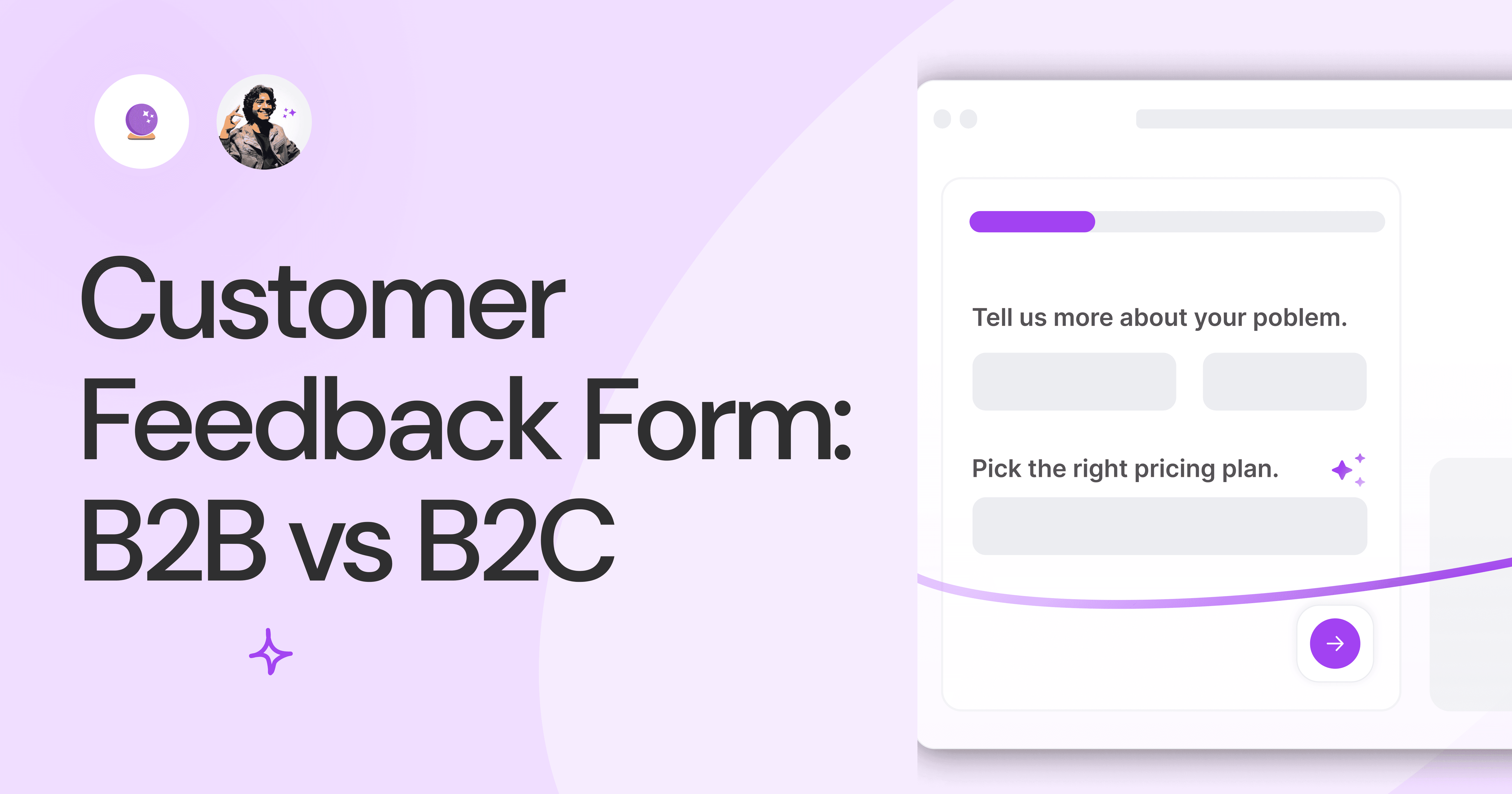
Customer Feedback Form: B2B vs B2C.
Why is customer feedback important? Because it dictates progress on B2B and B2B products and services for the customer to meet their goals.
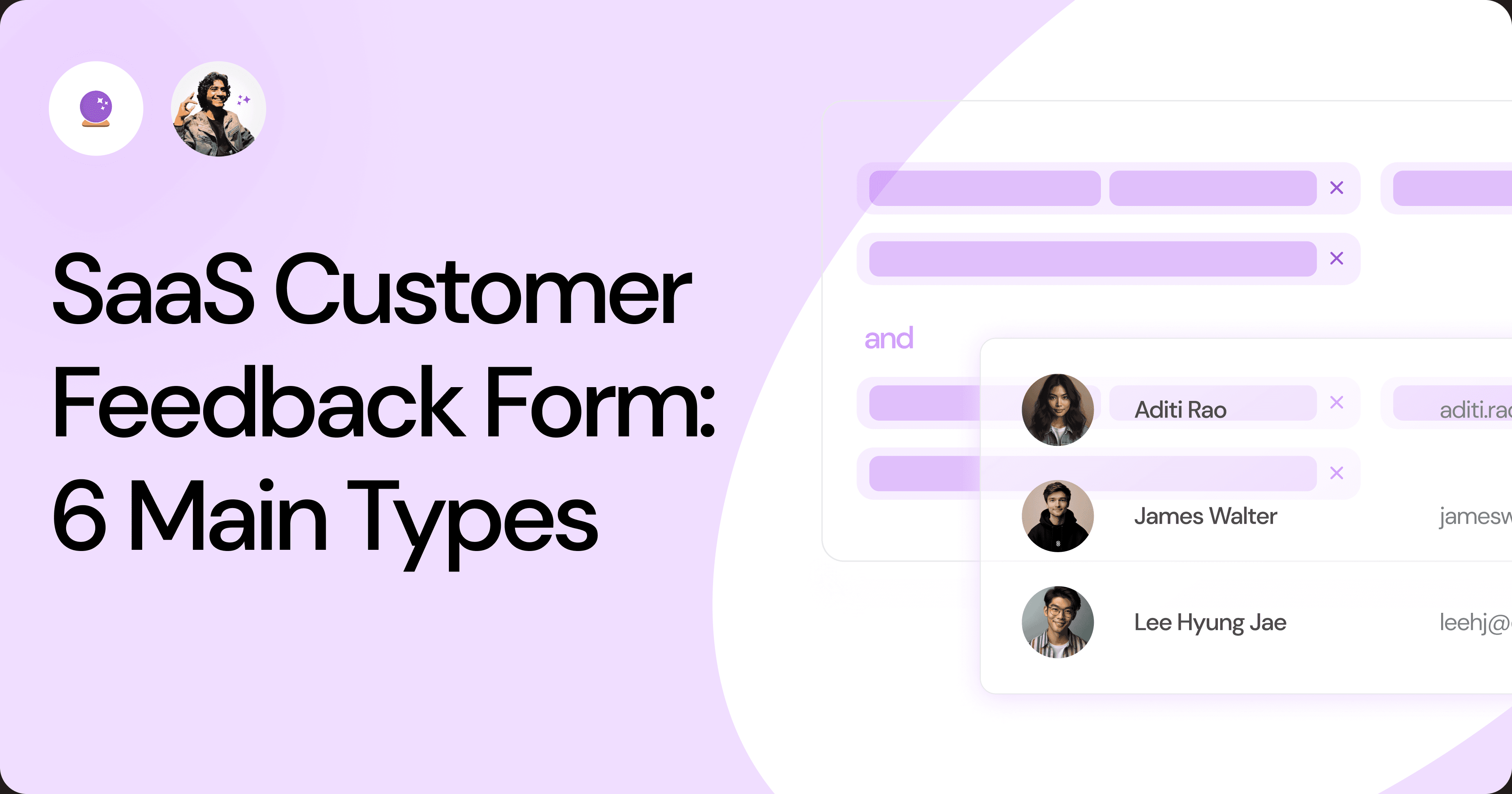
SaaS Customer Feedback Form: 6 Main Types.
As much as SaaS is self-serve, the role of a customer feedback form is highly relevant. There are different types, each with its use case and sections.
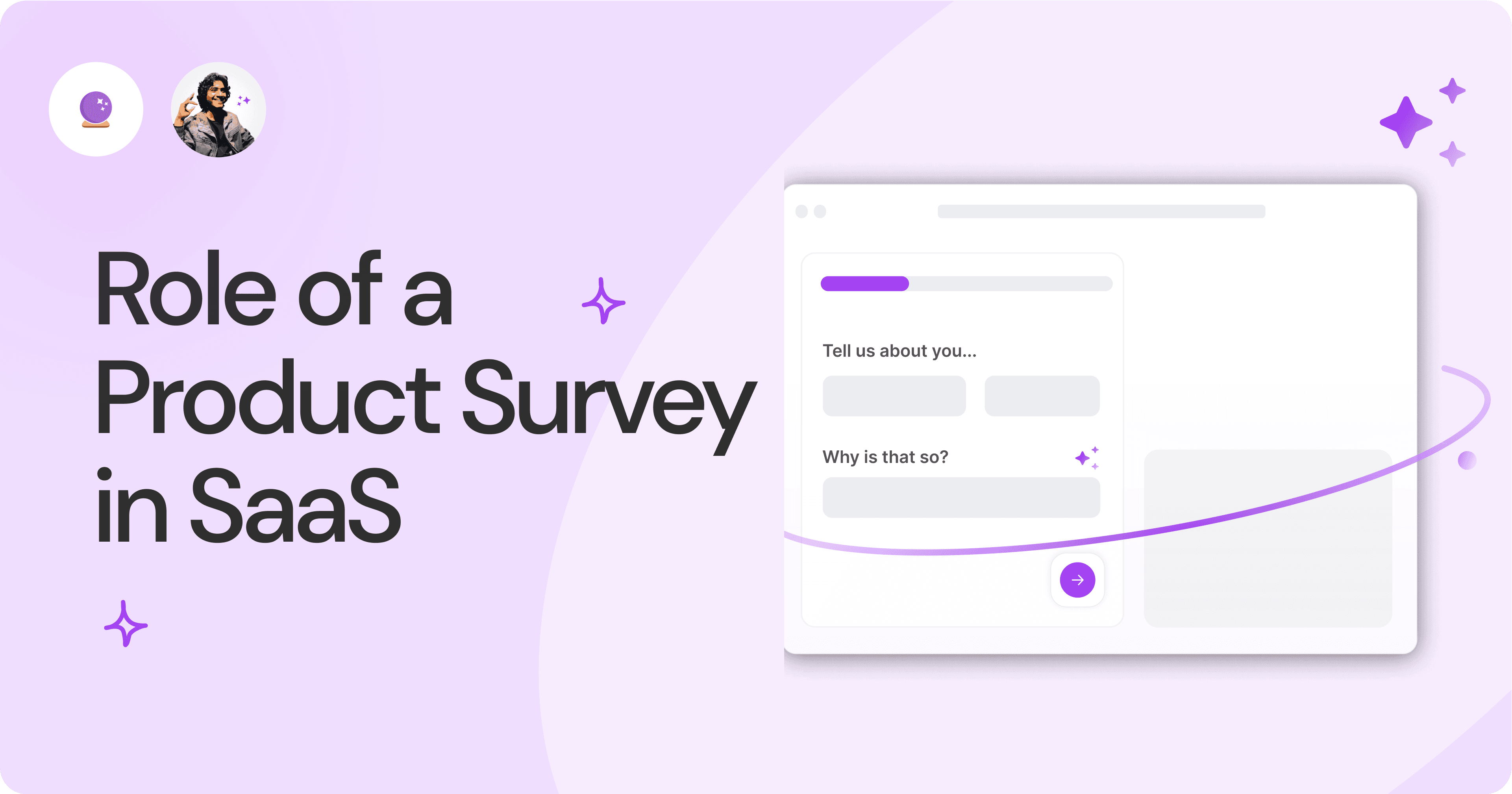
Role of a Product Survey in SaaS.
SaaS is all about creating products for specific use cases. This is where a product survey becomes all the more important to know the user deeply.

Should You Do a SaaS Market Survey?
Every SaaS company wants to grow fast. But without a market survey, growth isn't possible or sustainable. Let’s see how to do a market survey.

SAAS Pricing Calculators: B2B v B2C Online Forms.
The SaaS pricing calculator is an essential tool for both B2B and B2C SaaS companies. But how do you build it, right? We have you covered.

B2B SaaS: Making Book a Demo Form.
Having the perfect book a demo form for B2B SaaS is the first step in capturing leads. There are a few fundamental techniques to get this form right. Read on.

How to Get Started With SaaS Onboarding.
SaaS onboarding is essential for customer onboarding in B2B and B2C SaaS. Let’s understand its fundamentals, including the metrics.

Customer Feedback Form: B2B vs B2C.
Why is customer feedback important? Because it dictates progress on B2B and B2B products and services for the customer to meet their goals.

SaaS Customer Feedback Form: 6 Main Types.
As much as SaaS is self-serve, the role of a customer feedback form is highly relevant. There are different types, each with its use case and sections.

Role of a Product Survey in SaaS.
SaaS is all about creating products for specific use cases. This is where a product survey becomes all the more important to know the user deeply.

Should You Do a SaaS Market Survey?
Every SaaS company wants to grow fast. But without a market survey, growth isn't possible or sustainable. Let’s see how to do a market survey.

SAAS Pricing Calculators: B2B v B2C Online Forms.
The SaaS pricing calculator is an essential tool for both B2B and B2C SaaS companies. But how do you build it, right? We have you covered.

B2B SaaS: Making Book a Demo Form.
Having the perfect book a demo form for B2B SaaS is the first step in capturing leads. There are a few fundamental techniques to get this form right. Read on.

How to Get Started With SaaS Onboarding.
SaaS onboarding is essential for customer onboarding in B2B and B2C SaaS. Let’s understand its fundamentals, including the metrics.

Customer Feedback Form: B2B vs B2C.
Why is customer feedback important? Because it dictates progress on B2B and B2B products and services for the customer to meet their goals.

SaaS Customer Feedback Form: 6 Main Types.
As much as SaaS is self-serve, the role of a customer feedback form is highly relevant. There are different types, each with its use case and sections.

Role of a Product Survey in SaaS.
SaaS is all about creating products for specific use cases. This is where a product survey becomes all the more important to know the user deeply.

Should You Do a SaaS Market Survey?
Every SaaS company wants to grow fast. But without a market survey, growth isn't possible or sustainable. Let’s see how to do a market survey.

Nine Types of Healthcare and Medical Forms.
Medical forms are a must-have for any healthcare business or practitioner. Learn about the different kinds of medical and healthcare forms.
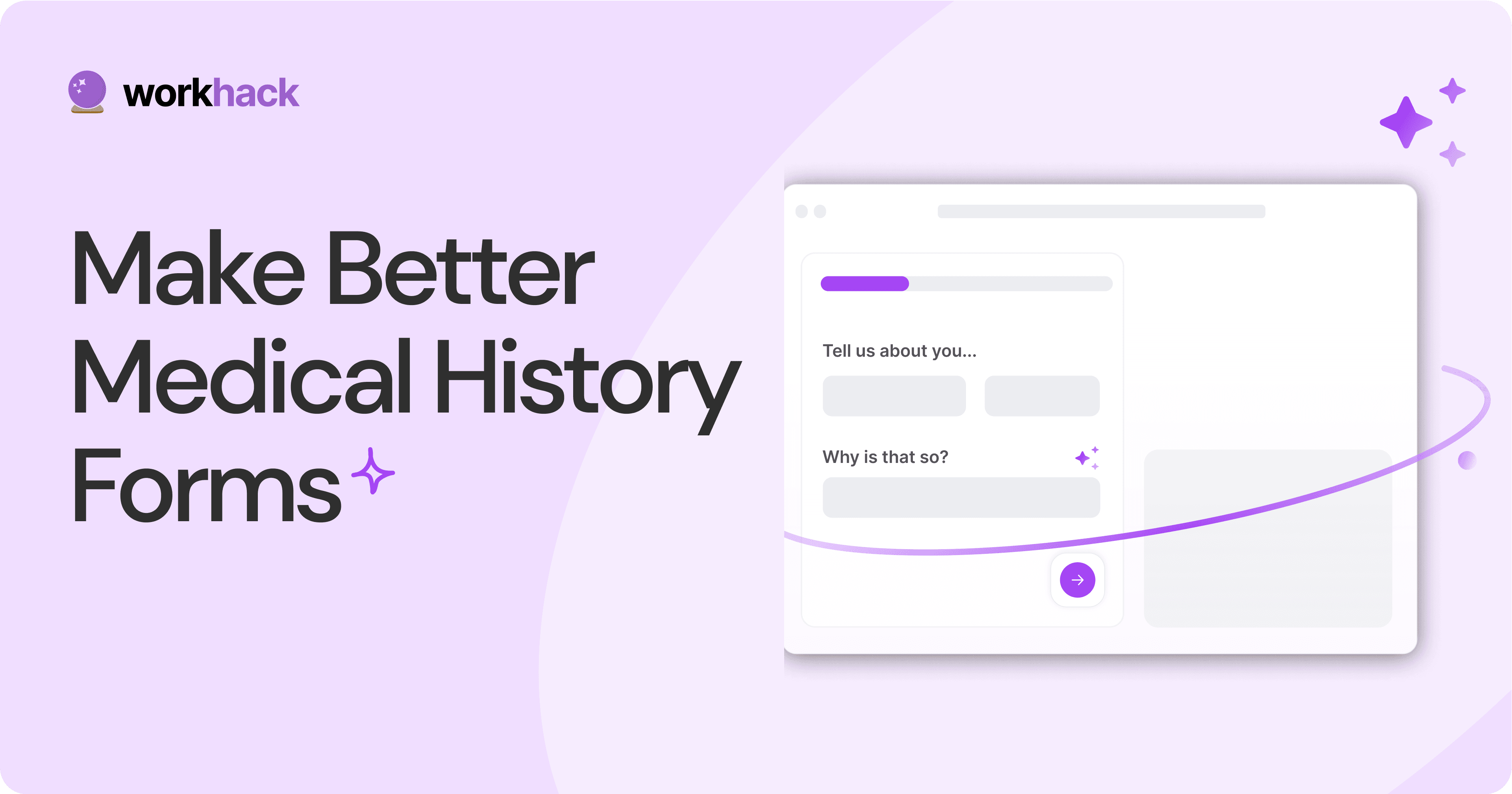
4 Tips for Better Medical History Forms.
Medical history forms are central to patient care, onboarding, and medical administration records. Learn how to make them easier to fill.
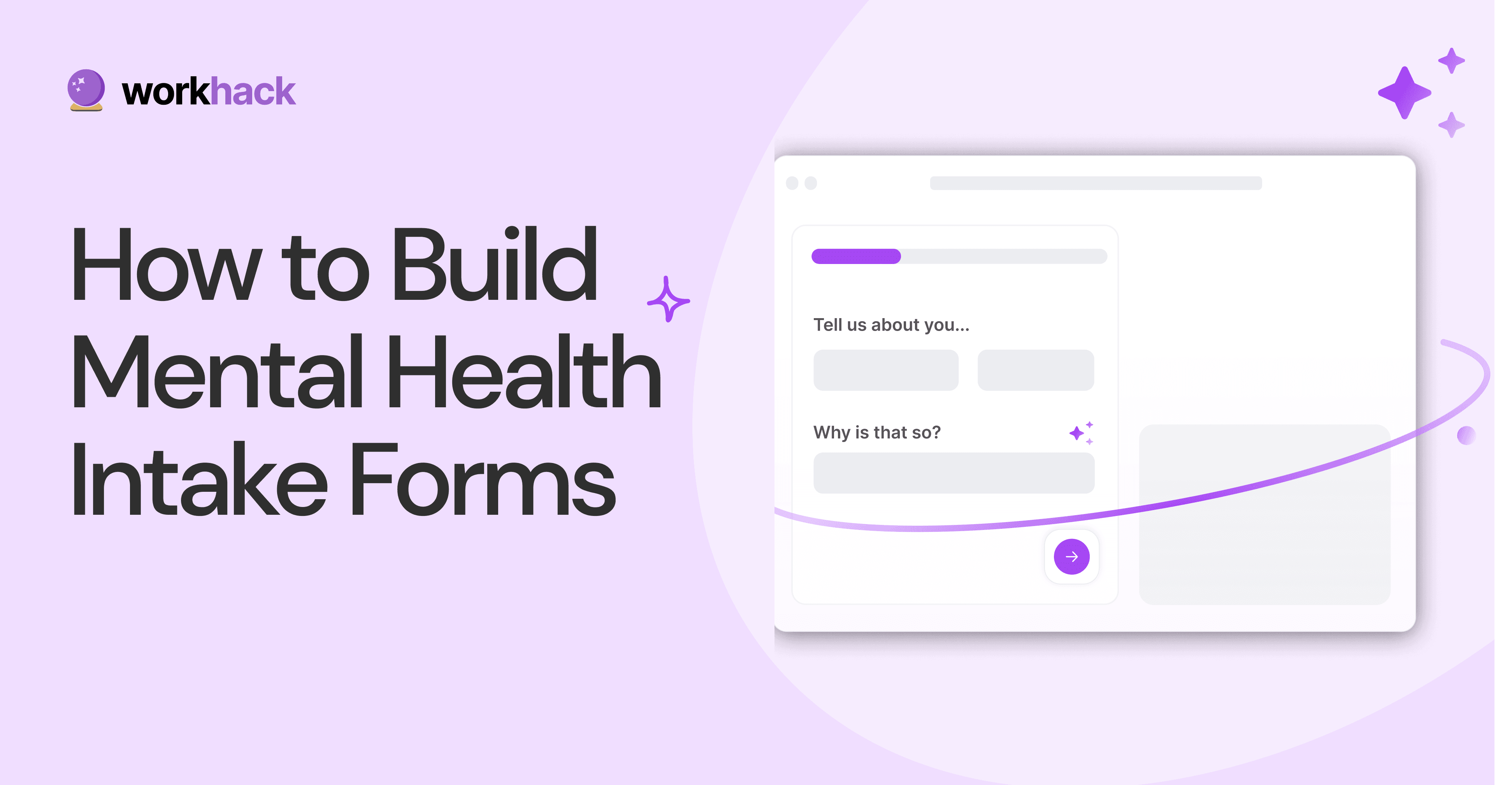
How to Build Mental Health Intake Forms?
Mental health intake forms are not like patient intake forms. Mental health intake forms deal with far more sensitive data and have specific design methods.
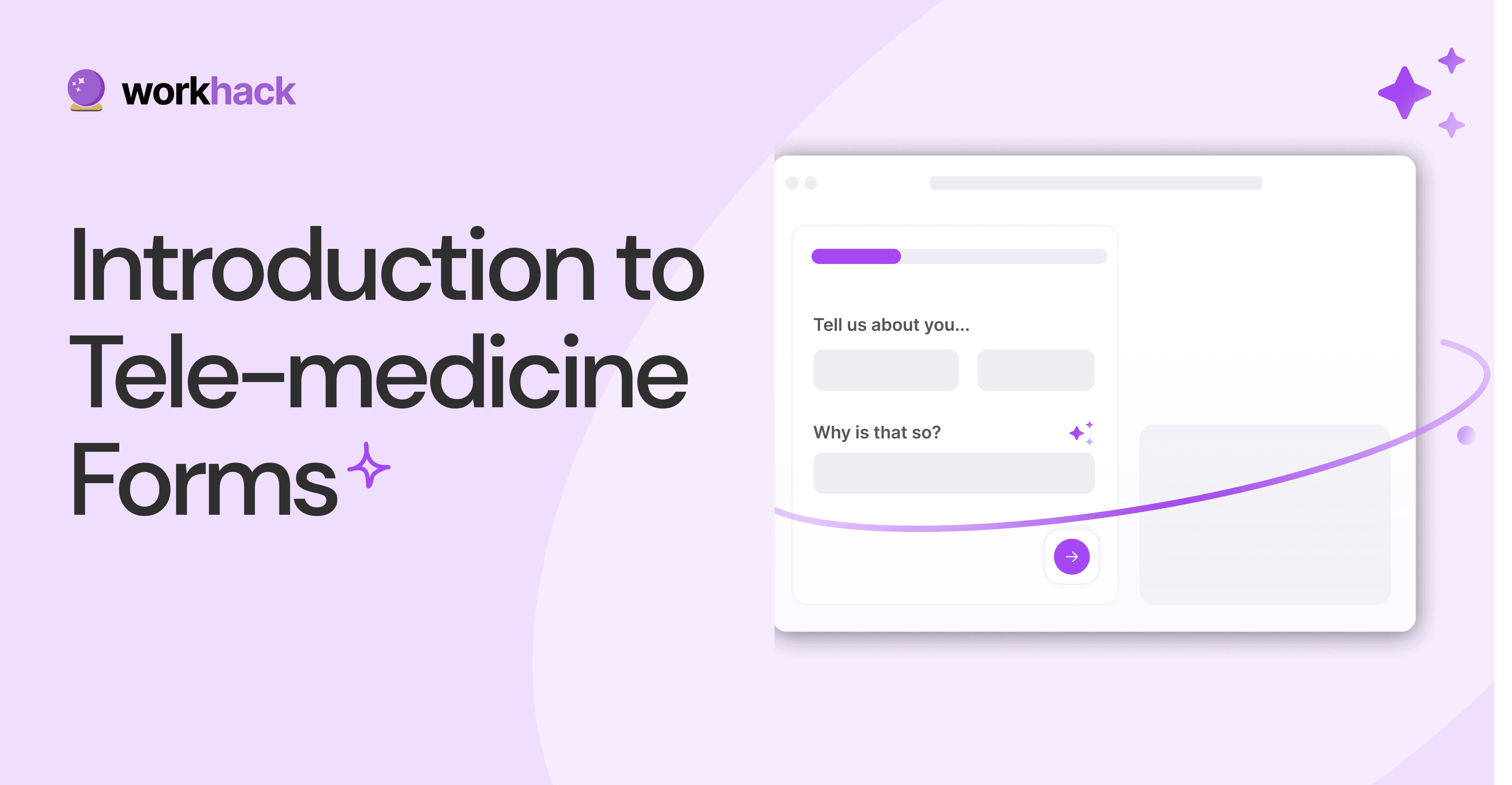
What, Why and How of Telemedicine Forms.
Telemedicine is on the rise and with different form builders out there, which one best suits your needs as a healthcare services provider?

3 Reasons for Major Drop-Offs in Medical Forms.
No matter which healthcare form we pick, there are major drop-off reasons. We shall dive into the top 3 and learn how to resolve them in your next form.
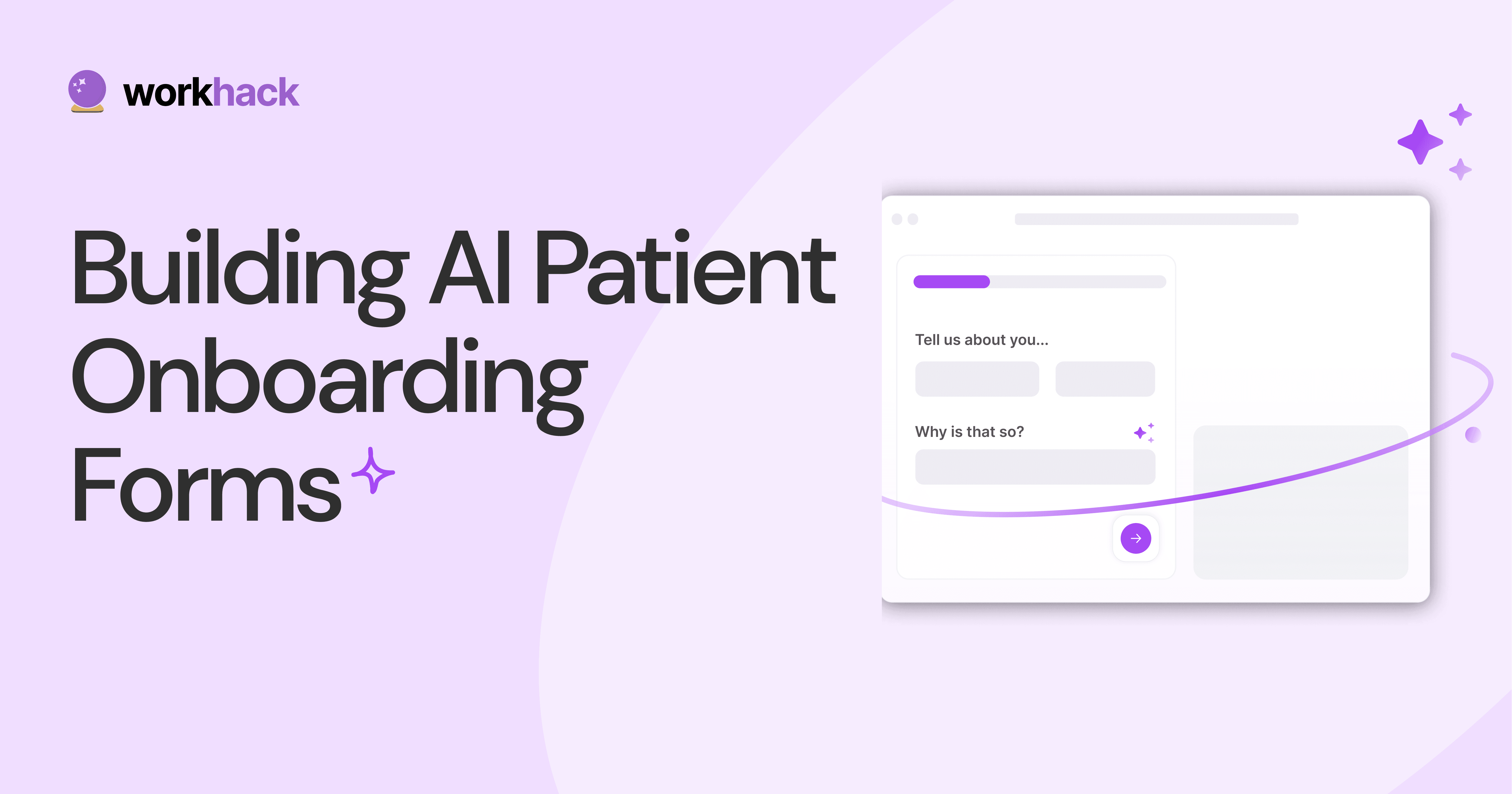
Patient Onboarding Forms - From Click to Clinic.
Patient onboarding forms are the first touchpoint for patients; getting this right for higher conversion rates is a must-have. Learn how to perfect them now.
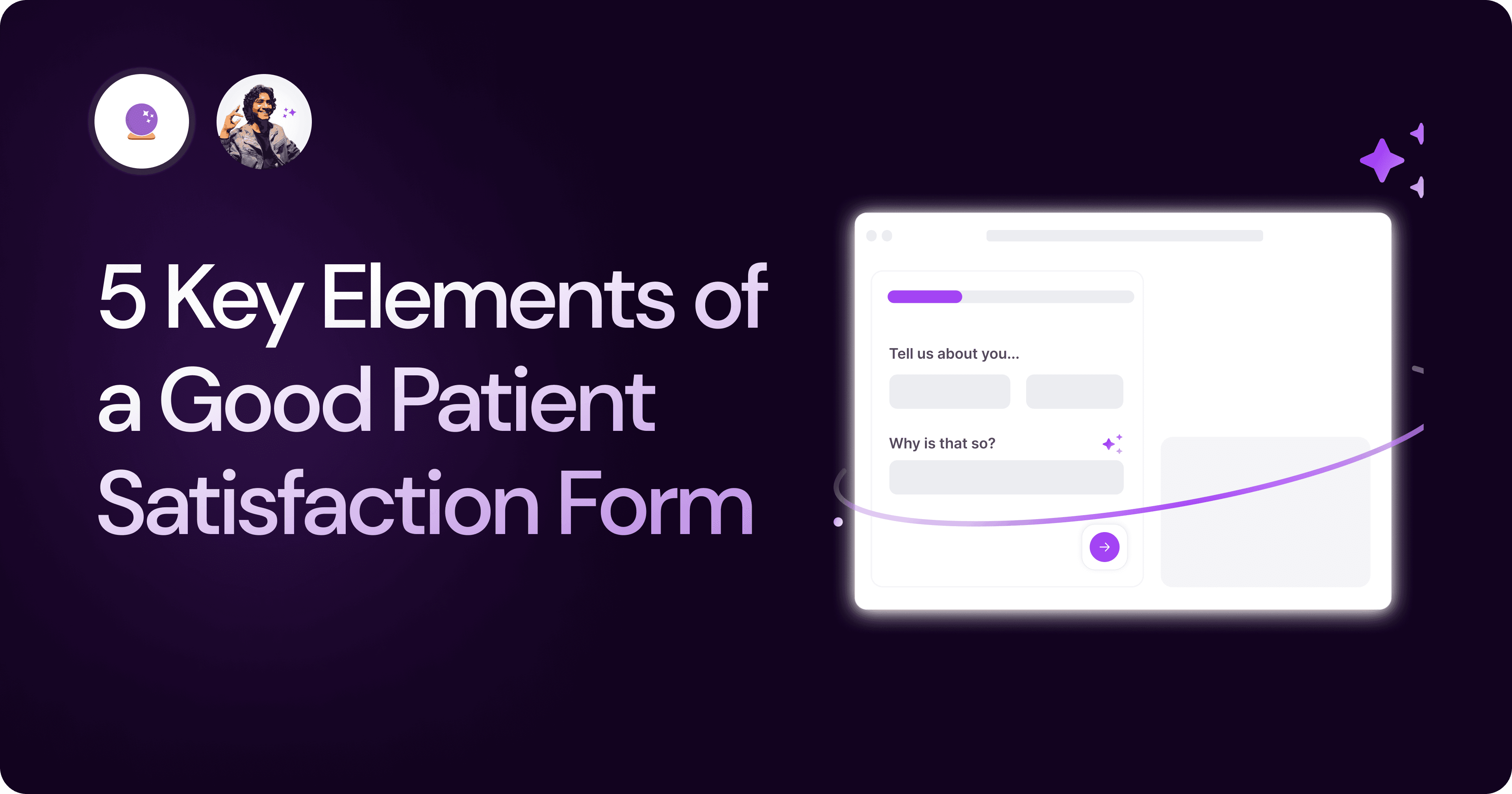
5 Key Parts of a Good Patient Satisfaction Form.
The goal of patient satisfaction surveys is to course-correct the services of a healthcare provider. Patient feedback leads to a culture of patient-centric care.
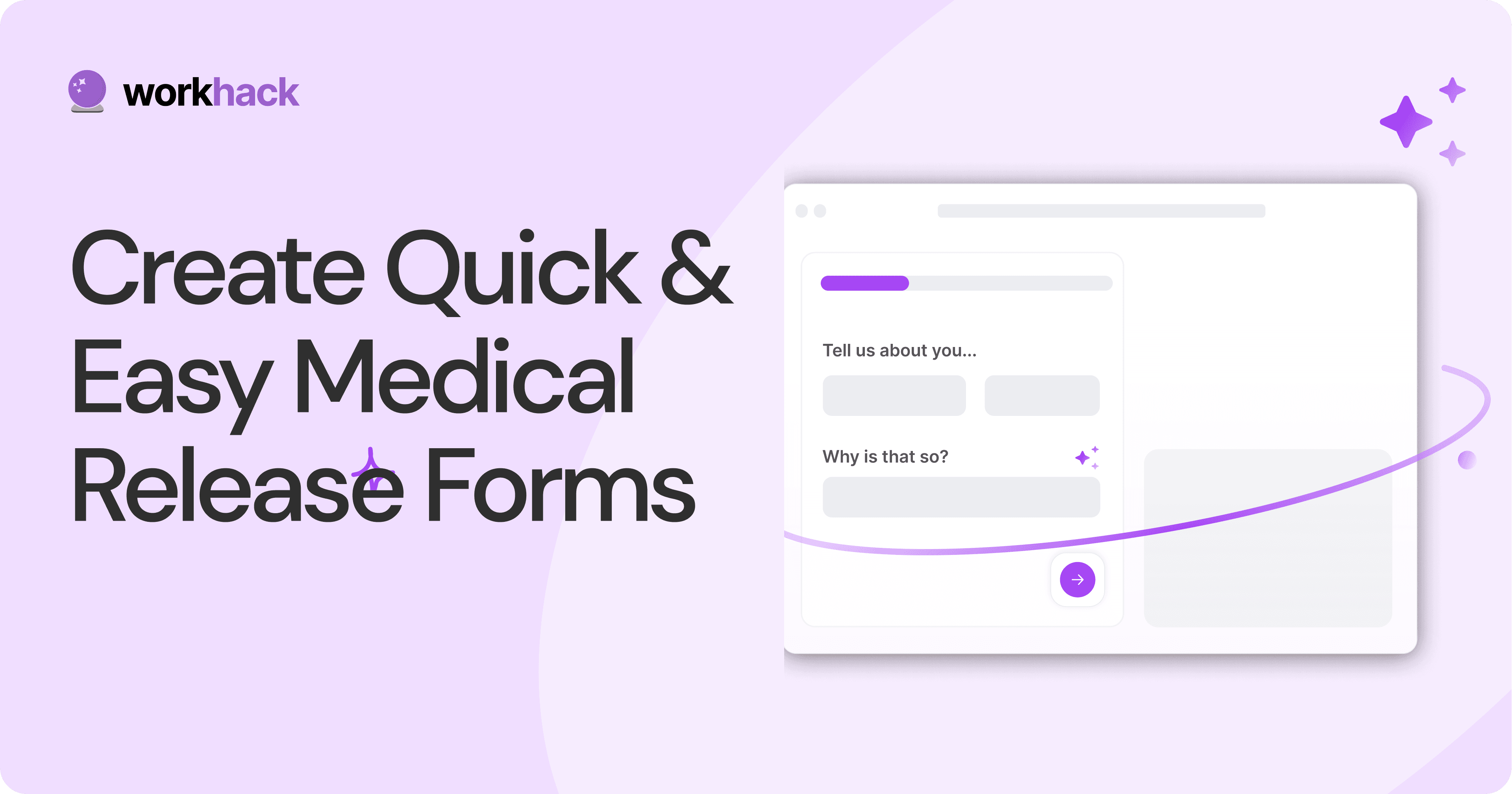
Build Quick and Easy Medical Release Forms.
Every HIPAA-compliant healthcare provider comes across medical release forms that involve details from medical history forms. Can they be shipped fast? Yes.

SAAS Pricing Calculators: B2B v B2C Online Forms.
The SaaS pricing calculator is an essential tool for both B2B and B2C SaaS companies. But how do you build it, right? We have you covered.

B2B SaaS: Making Book a Demo Form.
Having the perfect book a demo form for B2B SaaS is the first step in capturing leads. There are a few fundamental techniques to get this form right. Read on.

How to Get Started With SaaS Onboarding.
SaaS onboarding is essential for customer onboarding in B2B and B2C SaaS. Let’s understand its fundamentals, including the metrics.

Customer Feedback Form: B2B vs B2C.
Why is customer feedback important? Because it dictates progress on B2B and B2B products and services for the customer to meet their goals.

SaaS Customer Feedback Form: 6 Main Types.
As much as SaaS is self-serve, the role of a customer feedback form is highly relevant. There are different types, each with its use case and sections.

Role of a Product Survey in SaaS.
SaaS is all about creating products for specific use cases. This is where a product survey becomes all the more important to know the user deeply.

Should You Do a SaaS Market Survey?
Every SaaS company wants to grow fast. But without a market survey, growth isn't possible or sustainable. Let’s see how to do a market survey.
Subscribe to stay updated.
Subscribe to stay updated.
Subscribe to stay updated.
HC

HC

HC

HC

70+ people from across industries read our emails.
HC

HC

70+ people from across industries read our emails.
HC

HC

HC

70+ people from across industries read our emails.




Bangalore, India / San Francisco, US
WorkHack Inc. 2023
Bangalore, India
San Francisco, US
WorkHack Inc. 2023
WorkHack Inc. 2023
Bangalore, India / San Francisco, US
WorkHack Inc. 2023
Bangalore, India / San Francisco, US



